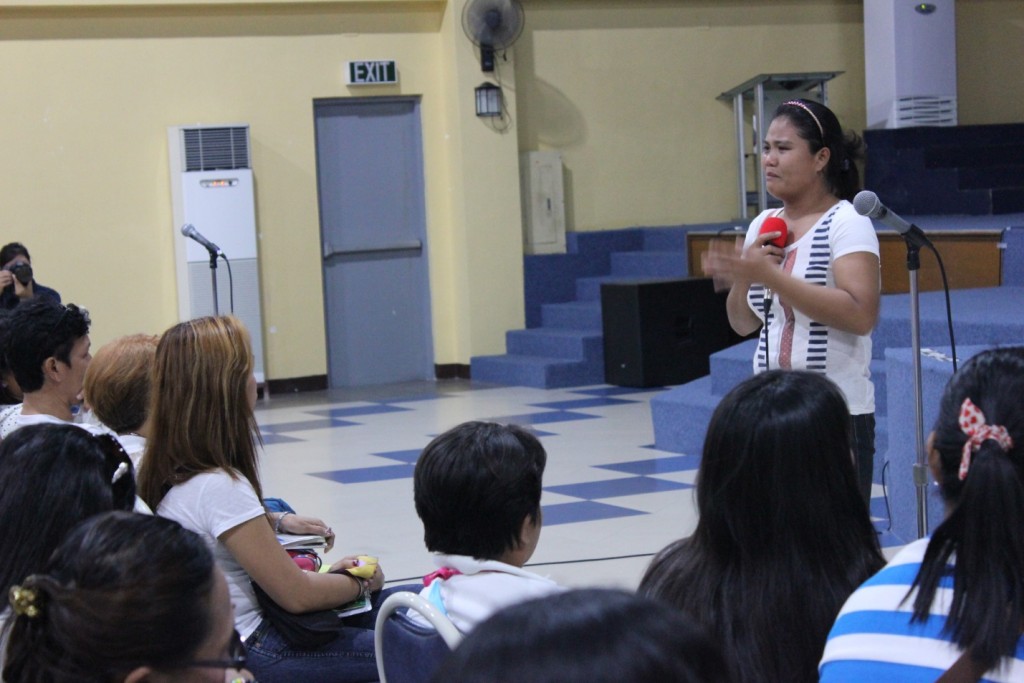
Divine Landingin used to leave Alabang, Muntinlupa City every night to work as a singer in a bar in Pampanga. With her nightly schedule, she had no option but to entrust her four-year-old child to the care of the security guards manning a fast food chain.
Homeless, Divine and her child, considered the fast food chain as their temporary home until they became beneficiaries of the Modified Conditional Cash Transfer for Homeless Street Families (MCCT-HSF) implemented by the Department of Social Welfare and Development (DSWD).
The MCCT-HSF is an expansion of the Conditional Cash Transfer (CCT) program which provides a complete package of assistance to street families, including responsive shelter programs, with access to social services, and economic opportunities for the improvement of their living conditions. It also extends house rental assistance of up to P4,000 per month for six months to one year.
Complicated past
Coming from a broken family in Cebu City, Divine was under the custody of her mother when she was a child.
But as she got older, her father brought her to Nueva Ecija but eventually left her under the care of his brother , Edgar, who lives in Muntinlupa City.
Divine finished her secondary education through the Alternative Learning System (ALS). After her graduation, she decided to work as a singer in Pampanga to help her uncle.
It was in Pampanga where Divine met Danilo, a seaman. Danilo and Divine then had a child, Daniela. Danilo was good provider. The years that they lived together as a family were the happiest times in their lives as Danilo provided well enough for their needs until his death in 2013 due to diabetes.
“Nakapundar kami ng walong-pintong apartment. Masaya ang pamumuhay namin noon kaso hindi kami nakapagpakasal ni Danilo kaya noong nawala siya, nawala rin sa amin ang lahat (We were able to invest in an eight-door apartment. Life was happy then, but since we were not married, I lost everything when he died),” Divine continued.
Living on the streets of Muntinlupa
With Danilo’s death, Divine’s life went downhill. Since she lost everything, Divine and her daughter were forced to live on the streets.
“Nung nawala si Danilo, nahihiya akong bumalik sa pamilya ko dahil baka pag-usapan lang kami. Napilitan kaming tumira sa kalsada ng anak ko at bumalik din ako sa dati kong trabaho (When Danilo died, I was too ashamed to go back to my family. We were then forced to live on the streets and I went back to my old work in a bar),” Divine shared with teary eyes.
“Tumira kami sa labas ng Jollibee outlet sa Alabang Junction pati sa Luna Street sa Maynila kasi sa security guard ko ihinahabilin si Daniela tuwing gabi sa pagpasok ko sa trabaho (We stayed outside a Jollibee outlet at Alabang Junction and sometimes along Luna Street in Manila. I entrusted my child under the care of the security guards every night as I went to work),” she added.
Finally, a home of their own
After a year of running away from the reach-out team of the DSWD, Divine eventually coordinated with the Department in February 2014, for their inclusion in the MCCT-HSF. She then underwent program orientation and Family Development Sessions (FDS).
FDS serves as a venue where topics on effective parenting, home management, active citizenship, and electoral education, among others, are discussed. Attendance to FDS is one of the conditions to continue receiving the cash grants under the MCCT-HSF.
It is during the FDS that Divine realized how irresponsible she was for leaving her daughter unattended on the street while she was at work. From that time on, she vowed never to leave Daniela alone, whatever happens.
Now, they are living in an Alternative Family Home (AFH) being rented by DSWD in Cupang, Muntinlupa City as part of the MCCT-HSF.
Aside from receiving cash grants for Daniela’s health and education, Divine was among the parent leaders who availed of the Cash-for-Work of DSWD wherein she was employed for 10 days with a salary of P347 per day to manage the urban gardening at DSWD’s Elsie Gaches Village, a center catering to Persons with Disabilities (PWDs).
“Aside from providing street dwellers a safe place to live, MCCT also helps them regain their dignity. We will also further assess them for livelihood assistance to enable them to have a steady source of income, thereby ensuring that they will not go back to the streets,” DSWD Secretary Corazon Juliano-Soliman said.
Starting Over
Divine is now a parent-volunteer at Elsie Gaches Village. As a volunteer, Divine receives a daily supply of food.
Instead of traveling at night to be a singer in Pampanga, Divine works as a ‘barker’ calling for jeepney passengers for two hours every night. This is enough to earn her a living while keeping close watch over Daniela.
On weekends, Divine accepts laundry from neighbors to augment her income. DSWD-National Capital Region will further assess her for other appropriate interventions to sustain their economic well-being.
As a result of their new life off the streets, Daniela was able to attend school and was even recognized for her academic excellence. Recently finishing grade two, Daniela was recognized as top three of her class.
“Bukod sa hindi ko na napapabayaan ang anak ko, marangal pa ang mga trabahong pinapasok ko ngayon. Salamat talaga sa DSWD at naialis kami ng anak ko sa dati naming buhay. Salamat at hindi kami pinabayaan ng Panginoon (Beside the fact that I am able to care for my child, I also find dignity in my work. Thank you to DSWD for taking me and my child off the streets. I also thank the Lord for always looking after us),” Divine ended.
To date, some 3,542 homeless street families nationwide are registered under the MCCT-HSF of which 1,759 come from the National Capital Region. ###


